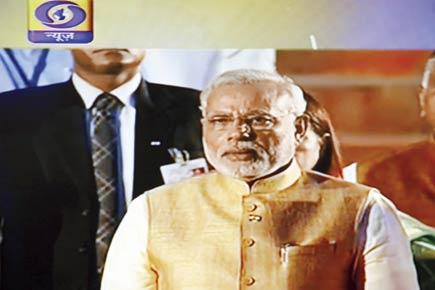Since everyone is busy making lists for what the new prime minister should or should not do, here are my two bits

 Since everyone is busy making lists for what the new prime minister should or should not do, here are my two bits. A gentle reminder to Narendra Modi on how upset he and his party were when an interview of his was apparently selectively edited by Doordarshan during the campaigning. Modi made all the right noises about DD’s struggle to maintain its freedom.
Since everyone is busy making lists for what the new prime minister should or should not do, here are my two bits. A gentle reminder to Narendra Modi on how upset he and his party were when an interview of his was apparently selectively edited by Doordarshan during the campaigning. Modi made all the right noises about DD’s struggle to maintain its freedom.
Manish Tewari, the then minister for Information and Broadcasting, dismissed the issue saying DD was an autonomous body. Here is hoping Modi and his new I&B minister Prakash Javadekar take this skirmish beyond electioneering into policymaking unlike most politicians who forget about the autonomy and freedom of Doordarshan when they come to power.

Here is hoping Modi and his new I&B minister Prakash Javadekar take this skirmish beyond electioneering into policymaking unlike most politicians who forget about the autonomy and freedom of Doordarshan when they come to power. Pic/AFP
If this Modi Sarkar is really about governance with a difference, then it should do all the things that the Sam Pitroda Committee’s report on Prasar Bharati, submitted earlier this year, recommends. But first a quick backgrounder into the tortuous birth of Prasar Bharati Corporation, the holding body for All India Radio (AIR) and Doordarshan (DD).
The Emergency in 1975 created the demand for autonomy and a working group was formed. The result was the Akash Bharati Bill of 1978, which had lapsed, was re-examined and presented as the Prasar Bharati Bill in 1989. Although the Bill was passed in 1990, it was notified only in 1997.
Under the Act, DD and AIR were converted into government corporations to be overseen by a statutory autonomous authority established under the Prasar Bharati (Broadcasting Corporation of India) Act, 1990. Yet, this very Act does not give the corporation any autonomy. On the basis of the assets it owns, Prasar Bharati is one of the richest media firms in India.
But it cannot sell or leverage them to raise money without the approval of Ministry for Information & Broadcasting. Actually it doesn’t even own these assets — 1,400 transmission towers, lots of spectrum and real estate — since no government ever transferred them to Prasar Bharati after the act creating it was passed in 1997. What’s more Prasar Bharati cannot hire or fire its people under the act.
The Act was flawed to start with. Its execution was delayed and none of the things that would have made Prasar Bharati truly independent were done. The pathetic state of DD and AIR then is the result of years of institutional neglect and abuse.
Think about it. After so many years, the Rs 1,553 crore Prasar Bharati Corporation is one-fourth the size of say Zee Group but has four times as many employees. And you cannot argue that it is a public service broadcaster with a different mandate because it hasn’t fulfilled that either.
There remain only 10 million pure DD homes, the ones who get the signal through terrestrial. The rest of the 143 million TV homes in India have DD because it is mandatory for private distributors in DTH or cable to carry DD channels. Many of us, however, hardly see them.
The fact is that even the poorest of poor are switching to cable or free DTH. So in spite of mandatory carriage rules, access to mandatory feeds on sports events and a R1,200 crore to R1,500 crore subsidy every year, Doordarshan continues to lose audiences.
Doordarshan has the same not-for-profit funding model that BBC or Al Jazeera have. Why doesn’t it have the same hold that these two brands have over their mother countries and over the rest of the world?
Many of the reasons are listed in the Pitroda Committee’s report.
Prasar Bharati spends less than 15 per cent of its expenditure every year on content compared to the 60-70 per cent for global public service broadcasters. Almost 45 per cent of its staff is in the engineering department and 37 per cent in administrative support services. Only 19 per cent is in programming. That explains why 80 per cent of its content is outsourced.
The obvious solutions delinking it administratively and financially from the government. And most importantly fixing its goal should it be competing with private broadcasters or should it aim to become one of the world’s best public service broadcasters.
The Pitroda report is the fourth of its kind in just over a decade. It would be interesting to see if it breaks the jinx of the earlier ones, which said the same things but were junked by whichever political party was ruling.
The writer is a media specialist and author. Follow her on twitter at https://twitter.com/vanitakohlik
 Subscribe today by clicking the link and stay updated with the latest news!" Click here!
Subscribe today by clicking the link and stay updated with the latest news!" Click here!









